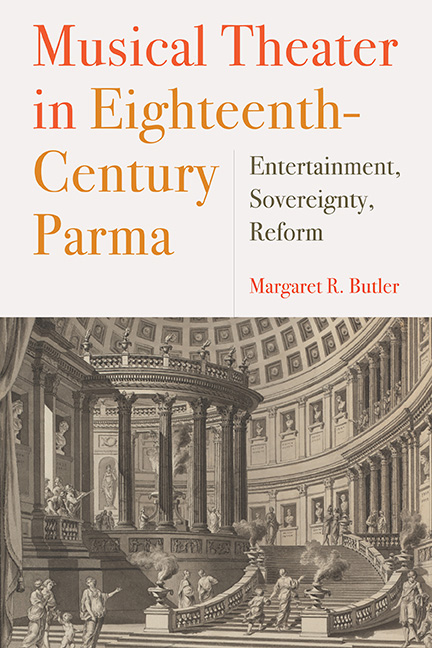Book contents
- Frontmatter
- Dedication
- Contents
- List of Illustrations
- Acknowledgments
- List of Abbreviations
- Notes to the Reader
- Introduction: The Genre Problem: Reform as Continuum and Brand
- 1 The Genesis of Parma's Projet
- 2 Behind the Scenes: Production and Management at the Teatro Ducale
- 3 The French Entertainments: Creation, Publicity, Propaganda
- 4 Moving On While Looking Back: Traetta's First Parma Operas
- 5 The End of the End of Reform: The Wedding, the French Ambassador's Opera, Traetta's Departure
- Conclusion: Reform Revisited
- Appendix: General Chronology
- Notes
- Bibliography
- Index
4 - Moving On While Looking Back: Traetta's First Parma Operas
Published online by Cambridge University Press: 24 October 2019
- Frontmatter
- Dedication
- Contents
- List of Illustrations
- Acknowledgments
- List of Abbreviations
- Notes to the Reader
- Introduction: The Genre Problem: Reform as Continuum and Brand
- 1 The Genesis of Parma's Projet
- 2 Behind the Scenes: Production and Management at the Teatro Ducale
- 3 The French Entertainments: Creation, Publicity, Propaganda
- 4 Moving On While Looking Back: Traetta's First Parma Operas
- 5 The End of the End of Reform: The Wedding, the French Ambassador's Opera, Traetta's Departure
- Conclusion: Reform Revisited
- Appendix: General Chronology
- Notes
- Bibliography
- Index
Summary
On 5 June 1758 Du Tillot received the news from Bonnet in Paris that the troupe's residence would soon be coming to an end. A flurry of activity ensued, one that represented a transition affecting the repertory in decisive ways. In the space of some eleven months, an almost complete overhaul of personnel occurred: the French singers, actors, some of the dancers, and Delisle left Parma; new dancers, a new French choreographer, and new Italian singers arrived; and Traetta came and composed Solimano (for carnival 1759) and Ippolito ed Aricia (premiering 2 May 1759). Mangot represents the thread of consistency that runs through this changeover; he is the single most influential source of continuity between the French troupe's departure and Traetta's arrival, and between the French entertainments and the Italian operas with French components. Important links were forged during this period of transition: those between the French troupe's presence and Traetta's first two reform operas, Ippolito ed Aricia and I tindaridi, and those between the two works themselves. The troupe's performances established precedents that profoundly influenced Ippolito ed Aricia and I tindaridi not only in certain aspects of shared personnel and in repertorial overlaps, as we have seen, but in the way Parma's audiences must have experienced these two operas. Ippolito ed Aricia and I tindaridi have more in common with each other than either does with any other of Traetta's works for Parma; most obviously, they are Italian adaptations of Rameau's first two tragédies en musique (Hippolyte et Aricie and Castor et Pollux), Parma gave them in the same performance season (spring, and not carnival), they share the same Italian solo singers, the same dancers and choristers, and they were linked in the minds of those who were concerned with the revenue they generated, as newly explored evidence demonstrates. It makes sense to view these two as a pair, of sorts. Yet they contrast greatly with each other in one important way: while Parma's audiences were well-acquainted with Castor et Pollux, having experienced the troupe's many performances of it, they had never before met Hippolyte et Aricie. This reality led the two operas to serve different purposes, a fact revealed mostly starkly by the element that at once links the works mostly closely and sets them apart from each other: their reuse of Rameau's music.
- Type
- Chapter
- Information
- Musical Theater in Eighteenth-Century ParmaEntertainment, Sovereignty, Reform, pp. 85 - 109Publisher: Boydell & BrewerPrint publication year: 2019



